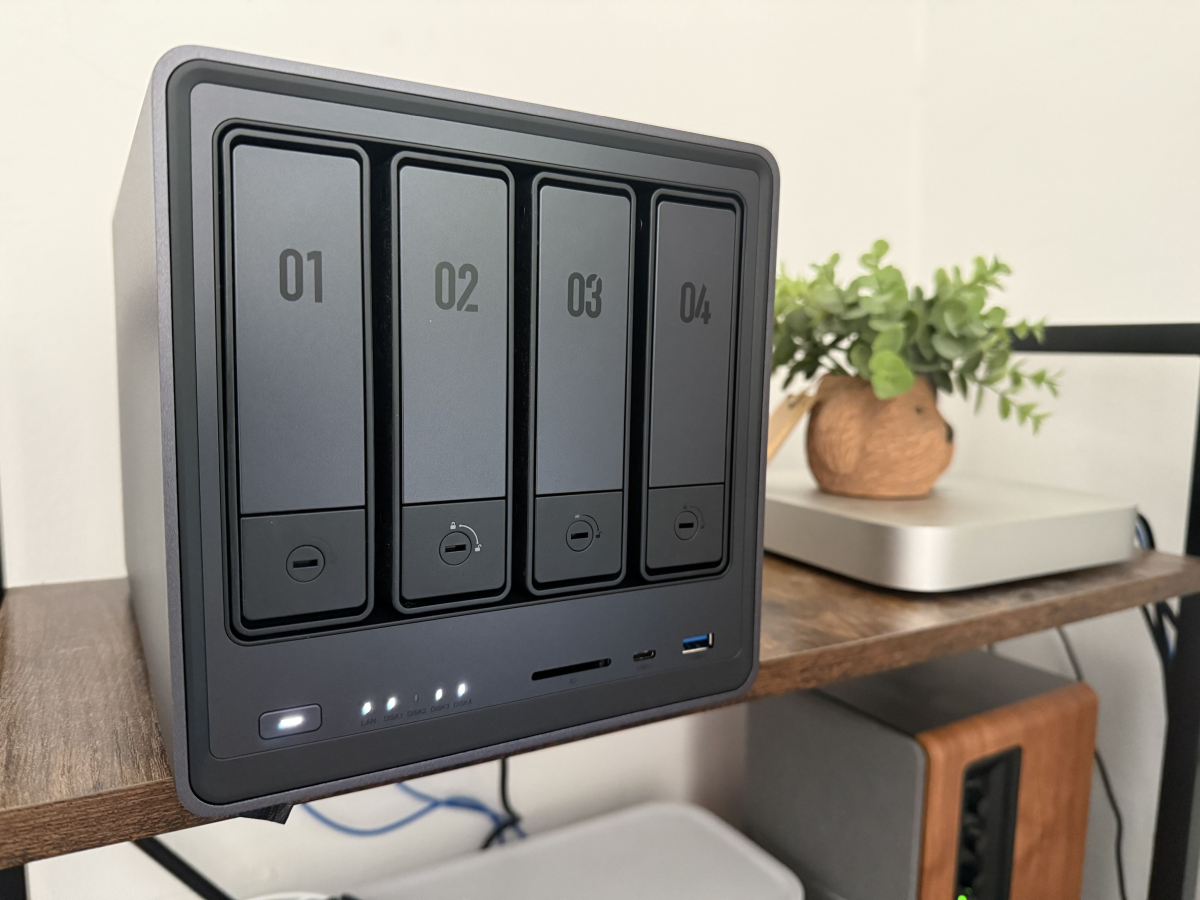I couldnt help it, it was just over £400 and I have been looking for a solid backup NAS solution, and I’ve been following UGREEN’s releases into the NAS world since their kickstarter. I mean, it just looks great.
This is the non-plus model, I was a little disappointed when I re-read the Amazon purchase page and realised I’d ordered the non-plus model, but at the same time there’s a couple of reasons why I feel that this will fit better into my current setup. Let’s dive in:
- It’s lower power. At 6W TDP it’s not going to hammer my electricity bill (which believe me, is high enough already over here in good old Blighty)
- It has 2x 2.5Gb network ports. The plus model has a 2.5Gb and a 10Gb option – this would be my main reason for opting for the plus over this, but at the moment I’m still dependent on spinning rust so it’s not a major concern. Plus, I’ve aggregated the two 2.5Gb ports for hopefully more throughput.
Edit: So apparently this isnt going to happen. Against all of what I thought I knew before, this would just enable two 2.5Gb streams at the same time, rather than 1 5Gb stream. Oh well. - The processor is “satisfactory”. This is an N100, a lower power mobile processor, as opposed to the model that’s in the plus SKU of the NAS. I’m going to be testing this with Plex, along with some docker containers, but for all measures I’ve been able to find online it seems that this will be enough for hardware transcoding, which is supported by the CPU.
- The plus variant has a 10Gb ethernet port, as opposed to duel 2.5Gb ethernet ports. This system is sitting on my desk and I am just not setup for 10Gb ethernet, purely only SFP+ 10Gb. This will change with the next UDM Pro. I also have a UniFi Switch XG, which does support 10Gb ethernet, but I just don’t want to be setting up a second UniFi installation on my desk when I have the mini rack full of grey blinky gear that’s the core of the network. I have a little 4 port 2.5Gb switch on my desk which also has 2 10Gb SFP+ ports (one for my main PC and one to get it back to the aggregation switch in the UniFi rack) so at the moment this just slots “straight in” to my current setup perfectly.
As with the UNAS Pro, I will be testing gaming from this device, I’ll move over my Steam library and see if I can free up space on my internal M2 drive on my gaming PC.
Edit: It’s too slow for anything but tiny 2D Steam games. I may offload the emulation packages I have onto the NAS instead of Steam, but it still doesn’t solve my local storage issue with my Steam library. Oh well, ho-hum, I guess I can see yet another NVMe purchase in my future.
So far drive writes to my setup (4x 2TB hard drives with 2 2TB NVMe M2 drives as cache) seems to be running at about 280MBs per second. This seems low to me. I’ve checked and the M2 cache is definitely being hit first, but I wonder whether more has to be done with the aggregation side that I just don’t understand yet.
Edit: As above, aggregation apparently doesn’t combine two 2.5 into one 5Gb connection. 280MBs seems to be the threshold maximum for a single 2.5Gb stream of data, so that’s the cap.
My hope was that my tinkering would levy something special out of this machine, alas, as you can see from the above edits, the Plus version would have most likely been more suitable. At this point, there’s really not a lot of difference between the cost of this device, and something like another UNAS Pro, which is 7 bay and has the networking just to slip right into my existing setup. However, the UNAS Pro also doesn’t tick all the boxes for usability that I would like for my ideal home server.
Choices would be to rebuild again, but last time I tried there were several issues with TrueNAS, and I just don’t feel like kicking that horse again. I’ve ran both Unraid and TrueNAS Scale with no issues, it probably wouldn’t take much, but at the same time I have realistically hit the wall of what I can afford at the moment, so there’s a good chance that in a year or two (or ten) I’ll keep an eye on the market and hopefully we will see some improvements in cost to performance.
